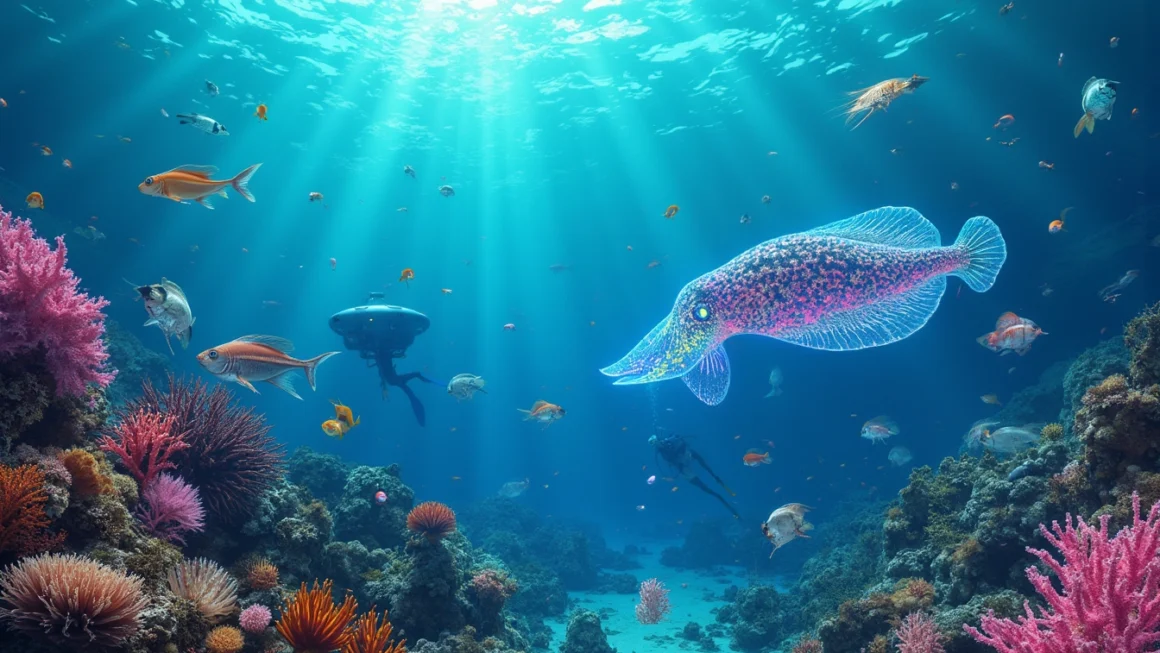In a surprising turn of events, researchers have discovered that the world’s oceans are teeming with an unexpectedly high number of previously unknown species. This groundbreaking finding has sent ripples through the scientific community, highlighting the vast biodiversity that remains hidden beneath the waves.
The Depths of Discovery
Table of Contents
A team of international marine biologists, led by Dr. Sarah Chen from the Ocean Exploration Institute, conducted an extensive five-year study across various oceanic regions. Their research, which involved advanced deep-sea exploration techniques and cutting-edge DNA analysis, has revealed a treasure trove of marine life previously unknown to science.
“We were astounded by the sheer volume and diversity of new species we encountered,” Dr. Chen stated. “It’s as if we’ve stumbled upon an entirely new ecosystem hidden in plain sight.”
Unveiling the Underwater Unknown
The discoveries span a wide range of marine life, including:
- Over 200 new species of fish
- Dozens of previously unclassified crustaceans
- Several new types of deep-sea corals
- A variety of unique microorganisms with potential medical applications
One of the most intriguing finds is a bioluminescent squid species that can change its light patterns, potentially using them for complex communication.
Implications for Marine Conservation
This discovery has significant implications for marine conservation efforts. Dr. Michael Patel, a leading marine ecologist not involved in the study, emphasized the importance of these findings:
“This research underscores how little we truly know about our oceans. It’s a wake-up call for enhanced conservation measures and the need for more comprehensive marine protection policies.”
Challenges in Ocean Exploration
Despite these exciting discoveries, ocean exploration faces numerous challenges. Limited funding, technological constraints, and the vast expanse of unexplored ocean areas continue to hinder comprehensive research efforts. Automation tools could potentially revolutionize ocean exploration by enabling more efficient data collection and analysis processes.
The Role of Technology in Marine Research
Advanced technologies played a crucial role in these discoveries. The research team utilized:
- Autonomous underwater vehicles (AUVs) for deep-sea exploration
- High-resolution imaging systems for detailed visual documentation
- Next-generation DNA sequencing for rapid species identification
These technological advancements have opened up new possibilities in marine research, allowing scientists to explore areas previously thought inaccessible.
Environmental Concerns and Biodiversity
The discovery of these new species comes at a critical time when ocean ecosystems face unprecedented threats from climate change, pollution, and overfishing. Dr. Chen and her team stress the urgent need for increased protection of marine habitats:
“We’re in a race against time. These newly discovered species, and countless others we haven’t yet found, could disappear before we even understand their role in the ecosystem.”
Potential for Medical and Technological Breakthroughs
Beyond their ecological significance, these new species hold potential for various scientific applications. Some of the discovered microorganisms show promise in the development of new antibiotics, while unique adaptations in deep-sea creatures could inspire advancements in materials science and technology.
Future of Ocean Exploration
This research has reignited interest in ocean exploration. Plans are already underway for follow-up studies to delve deeper into these newly discovered ecosystems. The scientific community is calling for increased funding and international cooperation to support more extensive oceanic research initiatives.
Conclusion: A New Era of Marine Discovery
The discovery of numerous new marine species marks the beginning of an exciting era in ocean exploration. It reminds us of the vast mysteries still lurking in the depths of our planet’s oceans and the critical importance of preserving these unique ecosystems.
As we continue to unravel the secrets of the deep, it becomes increasingly clear that our oceans are not just vast bodies of water, but complex, living systems teeming with undiscovered life. This research not only expands our understanding of marine biodiversity but also reinforces the urgent need for conservation efforts to protect these hidden wonders before they are lost to environmental changes.
The journey of discovery in our oceans has only just begun, promising a future filled with fascinating revelations about the life that thrives beneath the waves.




